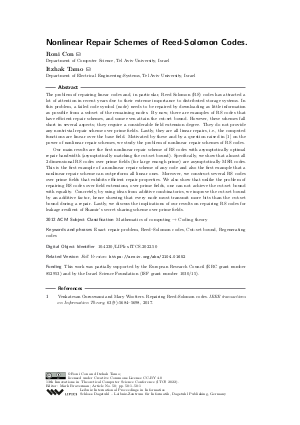Nonlinear Repair Schemes of Reed-Solomon Codes.
Authors Roni Con, Itzhak Tamo
-
Part of:
Volume:
13th Innovations in Theoretical Computer Science Conference (ITCS 2022)
Part of: Series: Leibniz International Proceedings in Informatics (LIPIcs)
Part of: Conference: Innovations in Theoretical Computer Science Conference (ITCS) - License:
 Creative Commons Attribution 4.0 International license
Creative Commons Attribution 4.0 International license
- Publication Date: 2022-01-25
File

PDF
LIPIcs.ITCS.2022.50.pdf
- Filesize: 298 kB
- 1 pages
Document Identifiers
Related Versions
- Full Version https://arxiv.org/abs/2104.01652
Subject Classification
ACM Subject Classification
- Mathematics of computing → Coding theory
Keywords
- Exact repair problem
- Reed-Solomon codes
- Cut-set bound
- Regenerating codes
Metrics
- Access Statistics
-
Total Accesses (updated on a weekly basis)
0Document
0Metadata
Abstract
The problem of repairing linear codes and, in particular, Reed Solomon (RS) codes has attracted a lot of attention in recent years due to their extreme importance to distributed storage systems. In this problem, a failed code symbol (node) needs to be repaired by downloading as little information as possible from a subset of the remaining nodes. By now, there are examples of RS codes that have efficient repair schemes, and some even attain the cut-set bound. However, these schemes fall short in several aspects; they require a considerable field extension degree. They do not provide any nontrivial repair scheme over prime fields. Lastly, they are all linear repairs, i.e., the computed functions are linear over the base field. Motivated by these and by a question raised in [Guruswami and Wootters, 2017] on the power of nonlinear repair schemes, we study the problem of nonlinear repair schemes of RS codes. Our main results are the first nonlinear repair scheme of RS codes with asymptotically optimal repair bandwidth (asymptotically matching the cut-set bound). Specifically, we show that almost all 2 dimensional RS codes over prime fields (for large enough prime) are asymptotically MSR codes. This is the first example of a nonlinear repair scheme of any code and also the first example that a nonlinear repair scheme can outperform all linear ones. Moreover, we construct several RS codes over prime fields that exhibits efficient repair properties. We also show that unlike the problem of repairing RS codes over field extensions, over prime fields, one can not achieve the cut-set bound with equality. Concretely, by using ideas from additive combinatorics, we improve the cut-set bound by an additive factor, hence showing that every node must transmit more bits than the cut-set bound during a repair. Lastly, we discuss the implications of our results on repairing RS codes for leakage-resilient of Shamir’s secret sharing scheme over prime fields.
Cite As Get BibTex
Roni Con and Itzhak Tamo. Nonlinear Repair Schemes of Reed-Solomon Codes.. In 13th Innovations in Theoretical Computer Science Conference (ITCS 2022). Leibniz International Proceedings in Informatics (LIPIcs), Volume 215, p. 50:1, Schloss Dagstuhl – Leibniz-Zentrum für Informatik (2022)
https://doi.org/10.4230/LIPIcs.ITCS.2022.50
BibTex
@InProceedings{con_et_al:LIPIcs.ITCS.2022.50,
author = {Con, Roni and Tamo, Itzhak},
title = {{Nonlinear Repair Schemes of Reed-Solomon Codes.}},
booktitle = {13th Innovations in Theoretical Computer Science Conference (ITCS 2022)},
pages = {50:1--50:1},
series = {Leibniz International Proceedings in Informatics (LIPIcs)},
ISBN = {978-3-95977-217-4},
ISSN = {1868-8969},
year = {2022},
volume = {215},
editor = {Braverman, Mark},
publisher = {Schloss Dagstuhl -- Leibniz-Zentrum f{\"u}r Informatik},
address = {Dagstuhl, Germany},
URL = {https://drops.dagstuhl.de/entities/document/10.4230/LIPIcs.ITCS.2022.50},
URN = {urn:nbn:de:0030-drops-156462},
doi = {10.4230/LIPIcs.ITCS.2022.50},
annote = {Keywords: Exact repair problem, Reed-Solomon codes, Cut-set bound, Regenerating codes}
}
Author Details
Funding
This work was partially supported by the European Research Council (ERC grant number 852953) and by the Israel Science Foundation (ISF grant number 1030/15).

